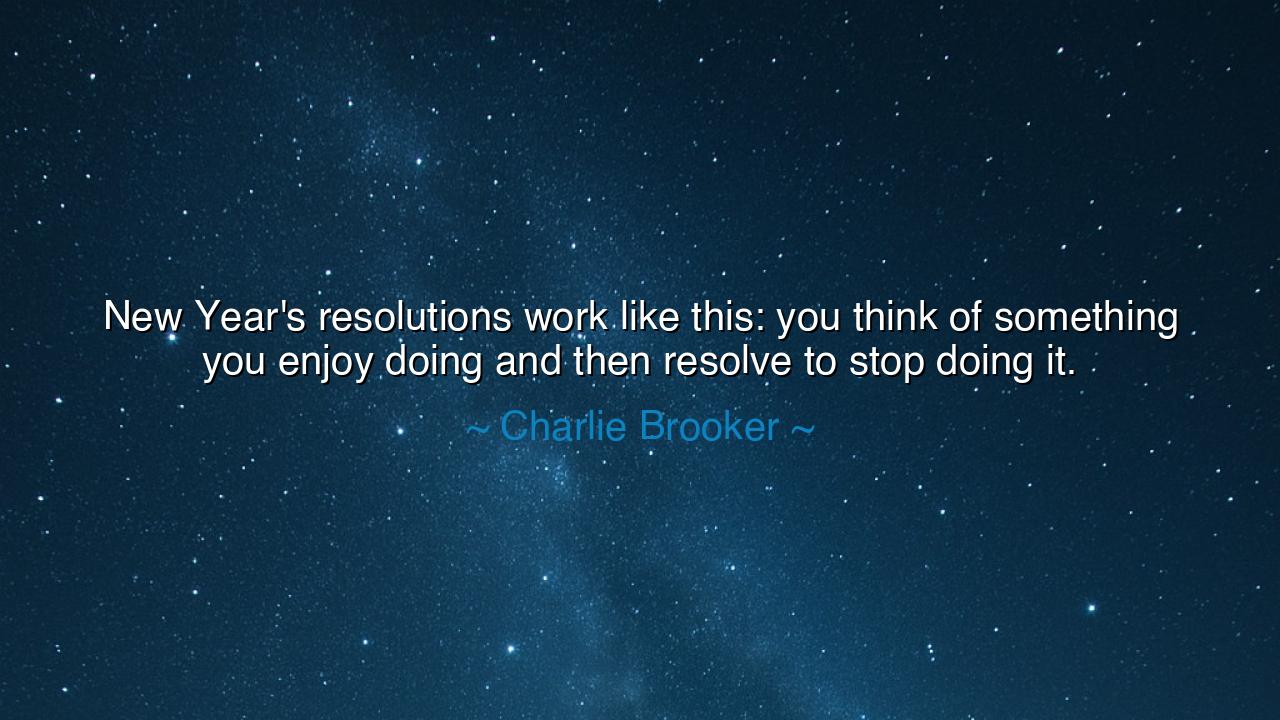
New Year's resolutions work like this: you think of something
New Year's resolutions work like this: you think of something you enjoy doing and then resolve to stop doing it.






From the dawn of civilizations, when the cycles of the sun and moon were marked by fires and festivals, people have greeted the turning of the year with vows of renewal. Charlie Brooker, a master of sharp wit and irony, speaks of this ancient custom with a jest that hides a piercing truth. He observes that New Year’s resolutions are often born of strange contradiction: one chooses something they enjoy doing and then solemnly resolve to stop doing it. Thus, what begins as a promise of self-betterment becomes a quiet act of self-denial.
In these words lies a reflection on the human spirit’s endless struggle between desire and discipline. The very habits that bring pleasure are often those that lead to ruin if left unchecked — indulgence in food, drink, idleness, or vanity. So at the dawn of a new year, people cast judgment upon their past selves, seeking to rise above their enjoyments by rejecting them. Yet this battle is rarely won, for the heart longs for what it has tasted, and the vow becomes a test of both will and weakness.
Brooker’s tone is playful, but his insight is ancient. It recalls the lessons of philosophers and sages who taught that humans are creatures divided, forever torn between their higher aspirations and their lower desires. His jest reminds us that many resolutions fail not because the goal is unworthy, but because the vow is made without deep understanding or true transformation. To simply forbid oneself from joy is to invite rebellion from within, and the cycle of breaking promises begins anew.
Thus, his words serve as both satire and wisdom. Let future generations remember that true renewal is not found in empty vows, but in the careful harmonizing of desire and purpose. To shape one’s life, one must look beyond mere denial and seek balance, choosing not only what to cast aside but also what to embrace. For only then will a New Year’s resolution become more than a fleeting jest and instead a step upon the eternal path of self-mastery.






TTLe Thu Thao
Charlie Brooker’s quote humorously reflects the typical resolution cycle: setting unattainable goals that make us feel restricted. Instead of stopping what we enjoy, how can we create resolutions that encourage a more balanced approach to life? Maybe New Year’s resolutions should be less about cutting things out and more about making room for things we enjoy while improving ourselves in a sustainable way.
BVTran Ha Bao Vy
I love Charlie Brooker’s sarcastic take on New Year's resolutions. It feels like most of us start the year with good intentions but then end up trying to eliminate all the things that make us happy. Is there a better way to approach self-growth without the all-or-nothing mentality? Why don’t we focus on enjoying what we love in moderation instead of trying to stop everything?
BNbaouyen nguyen
This quote perfectly captures the paradox of New Year's resolutions. It’s like we set ourselves up for failure by choosing things we enjoy and then deciding to stop them cold turkey. Is it possible to approach resolutions in a more sustainable way, where we find a balance between self-improvement and enjoying life? Why do we have to turn things into a punishment to make them 'better'?
ATTran Nguyen Anh Tu
Charlie Brooker’s take on New Year’s resolutions is a bit humorous but also rings true. We often set goals to stop doing things we enjoy, like eating certain foods or skipping workouts. But why do we frame our resolutions in a way that involves deprivation rather than improvement? Shouldn’t we be focusing on positive changes instead of cutting out the things we love?